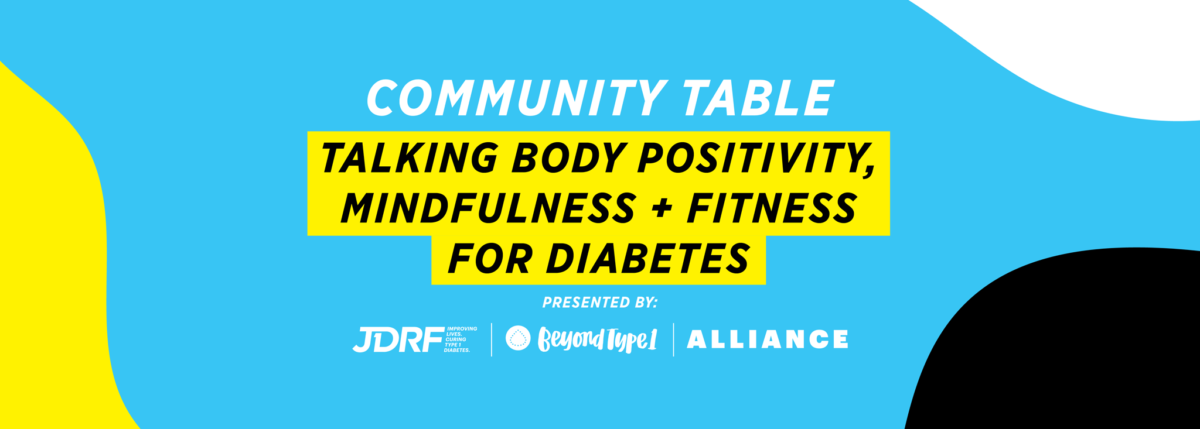Community Table: Body Positivity, Mindfulness + Fitness for Diabetes
Community Table is presented by the JDRF-Beyond Type 1 Alliance and made possible with support from Abbott Diabetes Care, Dexcom, Lilly, MannKind, Medtronic, Omnipod, Roche Diabetes Care and Tandem.
During our seventh Community Table discussion, Beyond Type 1 sat down with a group of experts and community members to focus on body positivity, mindfulness and fitness within both the type 1 and type 2 communities, and share helpful resources and personal perspectives. Watch the discussion in full!
Speakers included:
- Kylene Redmond, who served as the moderator for this event and has had type 1 since 2010. You can follow along with her at @blackdiabeticgirl on Instagram.
- Amanda Wass, who has had type 1 since 2012, is a yoga teacher in the UK.
- Tammie Snowden, who has had type 2 for five years.
- Donnielle (Don) Kirkland, who has had type 1 since 2003.
- Dr. Jose Jimenez Vega, a pediatric endocrinologist, with interest in the clinical care of people with diabetes, both type 1 and type 2.
- Bill Santos, who has had type 2 diabetes for three and a half years. You can follow him on Instagram and Twitter @NextWaveT2D.
Partial transcript of the conversation below, edited for content + clarity.
Tell us what your experience was like when you were diagnosed.
Don: I was diagnosed in 2003. I was 12 years old and I was on vacation in Georgia. During that time, I was extremely dehydrated, running to the bathroom a lot, and we had no idea what was happening. I went to Georgia in June and I didn’t get diagnosed until late August. It was like a summer of fear, we had no idea. We just thought it was the Georgia heat making me feel this way and in all reality, it was not. My body was breaking down and during that time it was scary, but this year is 18 years, so I’m excited. I say I’m beating it.
Amanda: I was suffering from the symptoms unknowingly for about nine months. I just thought I was super thirsty, dropped a lot of weight and super tired. It was my sister that was like, “Ah, maybe you’ve got type 1.” I didn’t go to the doctors, and then two weeks later, I went to my mom complaining that I’d lost a lot of weight, and she was like, “Oh, maybe you have type 1.” They’d both heard about it.
I went to the doctor and I told him the symptoms and he said, “Go to the hospital right away, get a blood test and we’ll be in touch in four days’ time.” It was four hours later, I sat on my bed eating some cheesecake because I did the night shift and obviously I took the cheesecake home. I had a call from the receptionist at the doctor’s, and it was four hours later and she said, “The doctor wants to see you to discuss your results.”
I finished the cheesecake, I went in, and when I got there he told me that I had type 1 diabetes (T1D). I remember being really numb about it. Part of me was grateful to have something because I was feeling so awful, and it was kind of like a way out in a way. It didn’t really hit me until I was told it wasn’t ideal to have chocolate by the dietician the next day, it’s like, “Maybe don’t.” That’s genuinely when the tears came.
Bill: I had no symptoms as far as diabetes was concerned. I was a bit overweight when I was diagnosed, but I actually showed up at an urgent care clinic with a really bad flu. I had a fever of 102 and I just wanted to get some relief. They ran a blood series on me and they came back and said, “Your blood sugar’s 300.” They checked my A1C and it was over 12, and they said, “You have diabetes. You need to go and see somebody right now.” I made an appointment, and within a day, I was at my doctor’s office. They ran more tests again at the lab in the doctor’s office, and we wound up having a pretty long talk as to what that was, what it meant and where I should be going from that day forward. That was three years ago, and it has changed my life in a number of different ways.
Tammy: I was at a training program for my job in Virginia. I woke up super thirsty, was thirsty every day of the training. It was terrible. Then I got dizzy during the training, and so I went to an urgent care and they drew blood, and a couple of hours later, someone was like, “Oh, well, your A1C is 13. Maybe you should see your doctor when you get home.”
When I got home, my doctor was like, “Your blood sugars are at 300. Why don’t you sit right here and I’ll be right back.” She gave me a prescription and said, “Congratulations, you have type 2 diabetes. Here’s a pamphlet and you can go.” I didn’t know what to do. I just went home embarrassed, I wanted to cry, but then I read a lot of stuff online and talked to a lot of people online thankfully.
I also got a new physician, which was key, and now I’m managing it quite well. I dropped some weight. I started eating better. I did have a habit of eating poorly, so I was like, “Oh, I did this to myself.” Overcoming that feeling, the guilt, has been an issue. It’s been about five years, so I’m doing better now.
What were the first tools you used in regards to body positivity, mindfulness and fitness to cope?
Tammy: I got a new physician, and she had a background in working with people with type 2 diabetes, and because I was older, I asked, “Well, what does that mean? Because there’s going to be other things happening, like menopause. How do I manage my body and my weight?” And she said, “Calm down. You didn’t cause it. There are some things you can do to make your situation better.”
She led me to a nutritionist who recommended trying activities that I could do, like yoga or walking because at first, I felt completely helpless. I was like, “I just take medication, and then that’s it. I can’t do anything to help myself because I did this to myself and now I can’t undo it.” That’s how I felt for a couple of years, actually. But I started to feel more empowered with the more information I got on how to manage my body, which helped me manage my mental health.
What is the importance of mindfulness when it comes to diabetes?
Dr. Jose: It’s really important to talk about your feelings. Are you frustrated? Are you depressed? Are you anxious? What’s going on? Because all of those things a lot of the times, they hide it, and then that is going to affect their blood sugars, in both ways. From their stress, they’re going to be releasing more cortisol into their bloodstream, so that is going to be affecting their blood sugars. Is that also because they feel like, “I’m not going to do anything because either way, if I do it or I don’t do it, it’s not going to work.”
A lot of the times when I see them, even if they don’t have a continuous glucose monitor (CGM), it’s like, “I don’t care if you check twice a day, but at least check that twice a day in a consistent manner so I can see and tell me what you did or you didn’t do. There’s nothing wrong or embarrassing about this. We’re working together. We swim together, we drown together. At least be honest and tell me what is going on or what is not really happening.” Because a lot of the times when a lot of patients are going through burnout, it’s like going through the answers of certain pageants. They’re going to save the world, they’re going to cure this, they’re going to do that. “Yeah, I’m doing my diabetes perfectly. I’m checking six times a day. I’m pointing at my CGM all the time. I’m bolusing eight times a day and I’m not missing any single dose.” But that’s just not the case.





